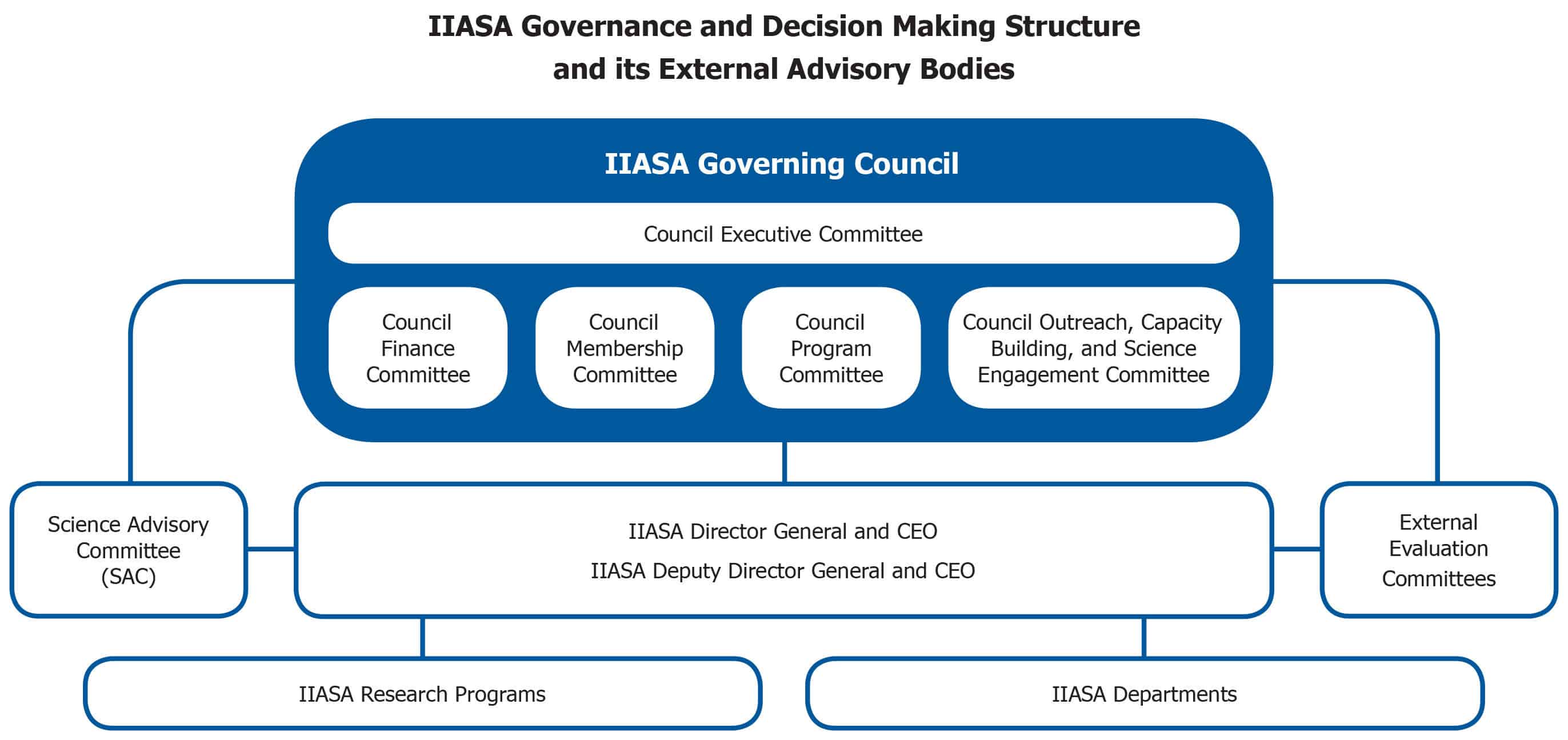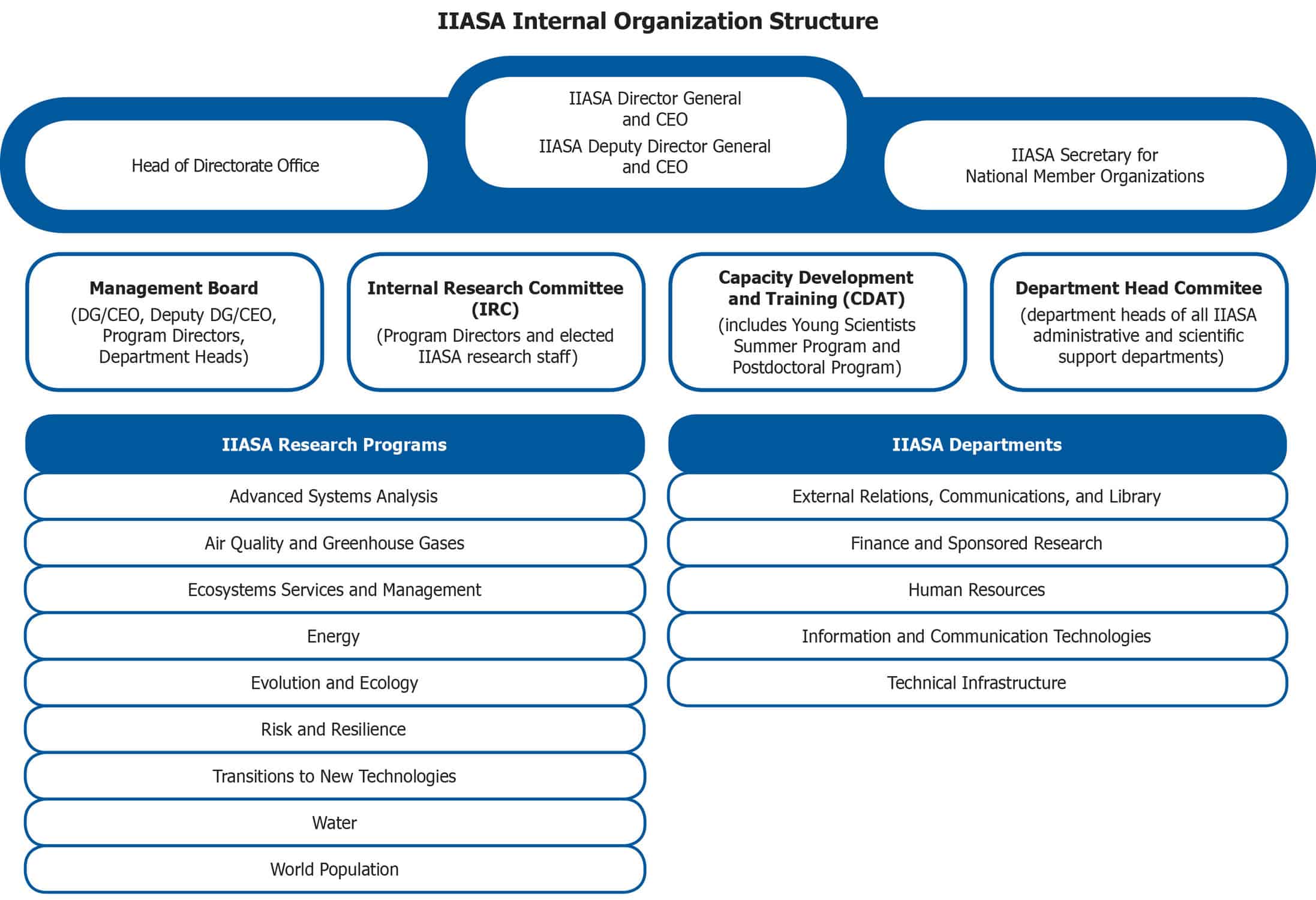Governance
Membership of IIASA
The IIASA Charter stipulates that membership of the institute is open to one professional institution from any country as long as it represents the relevant scholarly community of that country, subscribes to the IIASA Charter, and meets the financial obligations of membership. The IIASA Council votes on each country’s application to join the institute and on whether to discontinue a country’s membership.
In June 2018, Council thanked the Netherlands, represented by the Netherlands Organization for Scientific Research (NWO), for its contribution to IIASA as a member since 1977 and regrettably noted the NWO’s decision to discontinue its membership in 2019. Council also recognized the expiration of the observer membership status of Pakistan, represented by the Pakistan Academy of Sciences, and thanked them for their contribution to IIASA as a member since 2007, accepting with regret, that the Academy’s membership of IIASA had ended.
National Member Organizations
Each IIASA member country designates a National Member Organization (NMO) to represent the nation’s scholarly community, and act as a bridge between their research and policy communities and the institute. There are three types of NMOs namely, national academies, government research funding agencies, and autonomous organizations or committees. Each member country fulfills two main roles, which it enacts through its NMO. The first of these involves the governance of the institute through its representative council member for IIASA, while the second requires the NMO to act as a link between IIASA and national stakeholders.
IIASA National Member Organizations and Council members
On 31 December 2018, IIASA had 23 member countries (1 observer) represented by the following National Member Organizations:
AUSTRIA The Austrian Academy of Sciences (ÖAW)
Council member: Professor Dr. Gerhard Glatzel
BRAZIL The Brazilian Federal Agency for Support and Evaluation of Graduate Education (CAPES)
Council member: Professor Dr. Concepta (Connie) McManus Pimentel
CHINA National Natural Science Foundation of China (NSFC)
Council member: Professor Dr. Xincheng Xie
EGYPT Academy of Scientific Research and Technology (ASRT)
Council member: Professor Dr. Mahmoud M. Sakr
FINLAND The Finnish Committee for IIASA
Council member: Dr. Lea Kauppi
GERMANY Association for the Advancement of IIASA
Council member: Professor Dr. Helga Weisz
INDIA (Observer) Technology Information, Forecasting, and Assessment Council (TIFAC)
Council member: Mr. Sanjay Singh
INDONESIA Indonesian National Committee for IIASA
Council member: Professor Dr. Kuntoro Mangkusubroto
IRAN Iran National Science Foundation (INSF)
Council member: Professor Dr. Nosratollah Zargham
ISRAEL The Israel Committee for IIASA
Council member: Professor Dr. Moti Herskowitz
JAPAN The Japan Committee for IIASA
Council member: Professor Dr. Kazu Takemoto
KOREA, REPUBLIC OF National Research Foundation of Korea (NRF)
Council member: Professor Dr. Jung-Hye Roe
MALAYSIA Academy of Sciences Malaysia (ASM)
Council member: Professor Datuk Dr. Asma Ismail
MEXICO Mexican National Committee for IIASA
Council member: Dr. Julio A. Santaella Castell and Dr. Enrique Cabrero Mendoza
NETHERLANDS The Netherlands Organization for Scientific Research (NWO)
Council member: Professor Dr. Stan Gielen
NORWAY The Research Council of Norway (RCN)
Council member: Dr. Kirsten Broch Mathisen
RUSSIA The Russian Academy of Sciences (RAS)
Council member: Academician Professor Dr. Alexei Gvishiani
SOUTH AFRICA National Research Foundation (NRF)
Council member: Dr. Dorsamy (Gansen) Pillay
SWEDEN The Swedish Research Council for Environment, Agricultural Sciences, and Spatial Planning (FORMAS)
Council member: Dr. Ingrid Petersson
UKRAINE The Ukrainian Academy of Sciences
Council member: Academician Professor Dr. Anatoly G. Zagorodny
UNITED KINGDOM Research Councils of the UK
Council member: Professor Dr. Duncan Wingham
UNITED STATES OF AMERICA The National Academy of Sciences (NAS)
Council member: Professor Dr. Michael Clegg
VIETNAM Vietnam Academy of Science and Technology (VAST)
Council member: Professor Dr. Ninh Khac Ban
The IIASA Council
As the governing body of the institute, the IIASA Council is composed of one permanent representative from each NMO. The Council meets twice a year, in June and November. The Charter and subsequent resolutions of Council document the role of Council, its processes, and decisions.
The Council is responsible for determining financial and managerial policies and subject areas for IIASA research, as well as ensuring that IIASA activities are in line with institutional objectives, the provisions of the Charter, and the interests of NMOs.
The Council elects a chair and two vice chairs who act as officers of the Council. Michael Clegg (United States) has been the council chair since September 2017. Alexei Gvishiani (Russia) held the position of council vice chair since 2014, but stepped down at the end of 2018. He will be replaced by Lea Kauppi (Finland) as of January 2019. Gansen Pillay (South Africa) has been council vice chair since January 2018.
The Council appoints the director general and the deputy director general who, as the chief executive officers of the institute, are responsible for implementing the research program and managing the day-to-day operations. In 2018, the Council appointed Albert van Jaarsveld as the 11th director general of IIASA. Van Jaarsveld, a South African citizen, was the vice-chancellor and principal of the University of KwaZulu-Natal in South Africa, and president and CEO of the South African National Research Foundation prior to joining the institute.
The IIASA Council exercises its oversight responsibilities through a committee structure comprising an Executive Committee, a Finance Committee, a Membership Committee, a Program Committee, and an Outreach and Capacity Building Committee. Starting in January 2018, membership of these committees was agreed for a new three-year period. In addition, an external Science Advisory Committee and external evaluation committees provide specialized input to Council.
Council Committee Membership
On 31 December 2018, the Council Committee membership was as follows:
Michael Clegg, Council Chair
Alexei Gvishiani, Vice Chair
Gansen Pillay, Vice Chair
Executive Committee
Michael Clegg (Council Chair)
Alexei Gvishiani (Vice Chair)
Gansen Pillay (Vice Chair)
Ingrid Petersson
Asma Ismail
Helga Weisz
Duncan Wingham
Gerhard Glatzel (ex-officio as host country representative)
Connie McManus Pimental (rotating member for 2018)
Finance Committee
Ingrid Petersson (Chair)
Kazu Takemoto (Vice Chair from June 2018)
Gerhard Glatzel (Vice Chair until June 2018)
Lea Kauppi
Membership Committee
Helga Weisz (Chair)
Stan Gielen (Vice Chair for 2018)
Ninh Khac Ban
Kuntoro Mangkusubroto
Anatoly Zagorodny
Program Committee
Asma Ismail (Chair)
Kirsten Broch Mathisen (Vice Chair)
Moti Herskowitz
Enrique de Alba/Julia Taguena
Xincheng Xie
Nosratollah Zargham
Outreach, Capacity Building, and Science Engagement Committee
Duncan Wingham (Chair)
Connie McManus Pimentel (Vice Chair)
Jung-Hye Roe
Mahmoud Sakr
Evaluation and quality control
The IIASA Council oversees an array of activities that support its responsibility to offer guidance and assure the quality and relevance of IIASA research. It serves as a critical element in assuring NMOs of the value of the work done by the institute in return for their contributions.
In 2017, the Council commissioned an institutional review to provide an independent and comprehensive evaluation of the institute. Following the delivery of the report the Council established a task force to develop an implementation plan for the recommendations of the IIASA review.
At the end of 2017, Khotso Mokhele and Melody Mentz (both from South Africa) were respectively appointed as chair and secretary of the task force, which in addition comprised three members representing IIASA governance structures, four external experts, and four members from within IIASA.
The ultimate purpose of the task force was to facilitate an open and transparent process to achieve consensus on the future of IIASA, including its vision, mission, organizational structure, and governance. The task force developed an implementation plan and presented its final report to the IIASA Council in November 2018.
Another component of research oversight is the IIASA Science Advisory Committee (SAC). The SAC, established by the IIASA Council in 2002, comprises 14 international experts in fields relevant to IIASA research and its science to policy portfolio. The SAC has an academically and geographically diverse membership—based on nominations from NMOs and IIASA—and includes experts in the main areas of the institute’s research. In 2018, the SAC continued to provide independent, expert advice to the IIASA Council and directorate to ensure that the institute’s work continues to meet the highest scientific standards and remains relevant to policymakers.
Science Advisory Committee (SAC)
On 31 December 2018, the SAC membership was as follows:
Professor Dr. Mary Scholes – Chair
University of the Witwatersrand (Wits)
Johannesburg, South Africa
Dr. John R. Birge
The University of Chicago Booth School of Business
Chicago, IL, USA
Professor Dr. Mirjam de Bruijn
African Studies Centre
Leiden, Netherlands
Professor Dr. Ruth Defries
Department of Ecology, Evolution, and Environmental Biology
Columbia University
New York, NY, USA
Professor Dr. Bojie Fu
Research Center for Eco-Environmental Sciences
Chinese Academy of Sciences
Beijing, P.R. China
Professor Dr. Nils Petter Gleditch
Peace Research Institute Oslo (PRIO)
Oslo, Norway
Professor Dr. Jim Hall
Oxford University
Oxford, UK
Dr. Kil-Choo Moon
University of Science and Technology
Yuseong-gu, Daejeon, Republic of Korea
Dr. Youba Sokona
The South Centre and the University of Surrey
Geneva, Switzerland
Professor Dr. Mari Elka Pangestu
University of Indonesia and Centre for Strategic and International Studies
Jakarta, Indonesia
Professor Dr. Silvia Elena Giorguli Saucedo
El Colegio de México
Mexico
Professor Dr. Roberto Schaeffer
Federal University of Rio de Janeiro
Rio de Janeiro, Brazil
Professor Dr. Igor Sheremet
Bauman Moscow State Technical State University
Moscow, Russian Federation
Professor Dr. Karen Helen Wiltshire
Alfred Wegener Institute for Polar and Marine Research
Helgoland, Germany
IIASA Management
IIASA is currently structured into nine research programs and five departments that support the institute’s scientific activities. The director general and his deputy are supported by a Directorate Office, which is also in charge of managing exploratory and special projects. On 1 October Albert van Jaarsveld commenced his appointment as director general and chief executive officer replacing Pavel Kabat who left IIASA at the end of August. For the month of September Nebojsa Nakicenovic was acting director, and Markus Amann acting deputy director of the institute.

